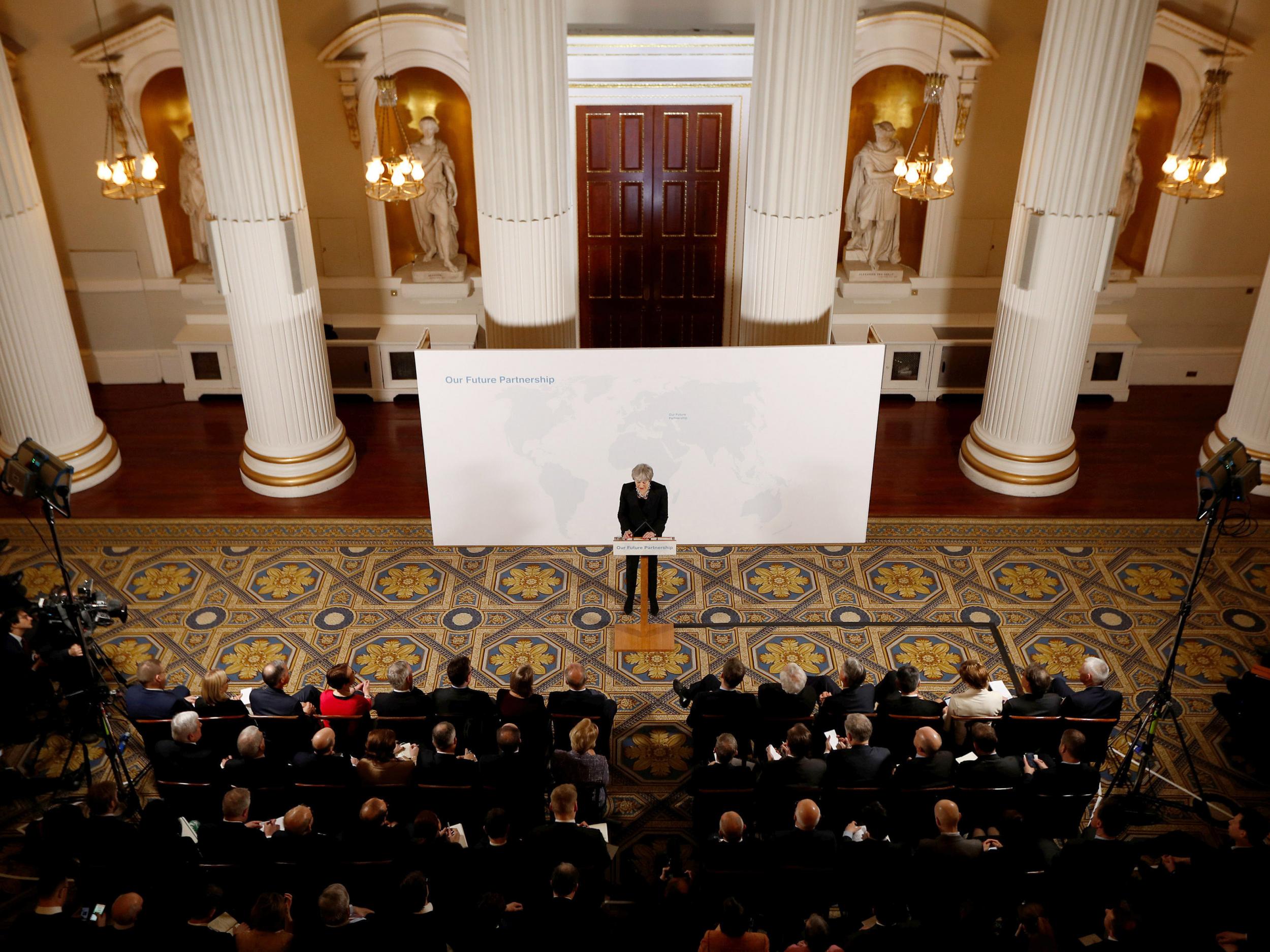Hardline Brexiteers will be much more worried about Theresa May's speech today than her party's pro-Europeans
Her speech is a sign that her hard Brexit will now have softer edges – but she made a tacit admission that the country is still deeply divided, and she only has herself to blame


It was billed as the moment when Theresa May finally stopped stopped pretending that the Government could have its Brexit cake and eat it. True, her 53-minute speech at London’s Mansion House included a welcome if belated recognition that some painful compromises lie ahead.
A Prime Minister noted for obfuscation promised to be “straight with people”: the UK cannot enjoy the benefits of EU membership after Brexit without the obligations. There were “hard facts” and “choices” to be faced, and “no one will get everything they want”. That message applied to both sides in the Conservative Party’s civil war on Europe, as well as to the UK and EU.
Hardline Brexiteers will be more worried about the speech than the party’s pro-Europeans. Significantly, May said she would “not be buffeted by demands to threaten a walkout” – a rejection of the approach favoured by Eurosceptics who prefer “no deal” and all the economic risks that would involve. Answering questions after her speech, she said she still believed “no deal is better than a bad deal” but merely paid lip service to the idea. This was a prime minister who wants an agreement, and is finally prepared for “ups and downs” in the coming months to get one.
Although May demanded less cake than previously, she still wants some. Her conciliatory tone will be welcomed in Brussels, but what detail she provided will not be. The Prime Minister denied the EU’s charge of “cherry-picking”, insisting the label applied to any free trade agreement. She went on to pick several cherries, even though a sector-by-sector approach to market access has long been ruled out by the EU. So much for her telling the EU that “we understand your principles”.
Similarly, Brussels will not welcome her bottom line: that Parliament will have the right to diverge from EU rules in future, a demand made by Brexiteers as part of the Cabinet’s fragile truce.

There were examples of a close economic partnership after Brexit, but on the UK’s terms – mutual recognition of standards, no “race to the bottom” on regulation and sticking to EU rules on state aid to industry and competition. May wants associate membership of EU agencies covering chemicals, medicines, aerospace and aviation, but did not concede that the UK would have to accept the European Court of Justice’s rulings in these areas. She will probably have to do so in the talks, diluting one of her red lines, even though hardline Brexiteers will not like it. She is getting there in baby steps, while insisting that ECJ jurisdiction will end.
The Prime Minister’s “five tests” for an EU deal offered little insight. If you say the opposite – for example, “we will NOT protect people’s jobs and security” – you can see the tests are motherhood and apple pie.
The welcome outbreak of realism was in part a recognition of the parliamentary arithmetic – symbolised by Jeremy Corbyn’s decision this week to support a customs union with the EU, which creates a Commons majority for one. However, May talked about a customs “agreement” and “arrangement”, which is unlikely to satisfy pro-EU Tories, and so the Government still faces a humiliating Commons defeat on the issue.
Despite this week’s bitter dispute with Brussels over Northern Ireland, May offered no new solutions to avoiding a hard border with Ireland, merely reiterating those already dismissed as “magical thinking” by Brussels. UK ministers hope to delay discussion until the last lap of the negotiations, in the hope that something turns up in the trade talks. But the EU may be less willing to rely on Mr Micawber.
For all her hints of flexibility, May’s limited room for manoeuvre was shown when the Cabinet discussed the speech on Thursday. Her proposal to promise to make a “binding commitment” to at least match EU regulation was watered down to a “strong” commitment after objections from Brexiteer ministers including Boris Johnson, David Davis, Michael Gove, Andrea Leadsom and Gavin Williamson (who voted Remain in the referendum).
For me, the most striking sentence in May’s speech was: “We must bring our country back together again, taking into account the views of everyone who cares about this issue, from both sides of the debate.”
This was a tacit admission that the UK is still deeply divided over Brexit. May has only herself to blame. Her allies express frustration that Remainers and Leavers are still fighting the 2016 referendum. But they have filled the vacuum in her first 20 months as Prime Minister left by her lack of leadership and her desire to float above the faction-fighting in her Cabinet and party.
She neglected the 48 per cent as she offered the Eurosceptics a hard Brexit to reassure them she was no longer a Remainer. Her speech is a sign that her hard Brexit will now have softer edges. But she has no right to expect those who want a soft Brexit or no Brexit to down their tools and placards in order to “come together”.
Join our commenting forum
Join thought-provoking conversations, follow other Independent readers and see their replies
Comments
Bookmark popover
Removed from bookmarks